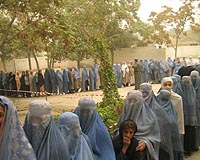 |
Washington (UPI) Sep 23, 2009 The late Speaker of the House of Representatives Thomas "Tip" O'Neill made famous the quote that "All politics is local." Nowhere is this aphorism truer or more relevant to success than in the war in Afghanistan. In their 2008 Atlantic magazine article "All Counterinsurgency is Local," Thomas H. Johnson and M. Chris Mason capture, in a single brief paragraph, the fundamental strategic flaw of our Afghan operations up until now. "Politically and strategically, the most important level of governance in Afghanistan is neither national nor regional nor provincial. Afghan identity is rooted in the woleswali: the districts within each province that are typically home to a single clan or tribe. Historically, unrest has always bubbled up from this stratum -- whether against Alexander, the Victorian British or the Soviet Union. Yet the woleswali are last, not first, in U.S. military and political strategy," Johnson and Mason wrote. Afghanistan is a blend of ethnic groups, languages, tribes and clans, which have traditionally provided religious, social, cultural identity and, in a power vacuum, an alternative government. Yet the influence and importance of tribalism in counterinsurgency operations has often been underestimated. U.S. Army Gen. Stanley McChrystal has been reported as saying "Afghan social, political, economic and cultural affairs are complex and poorly understood." Establishing central control in Afghanistan in the absence of an active insurgency would be difficult enough. Given the current perception of doubt and distrust in the Afghan central government among the populace, it may be an impossible task without knitting together coalitions among tribal groups. This can only be accomplished by first understanding tribal structures, their relationship with other tribes and their bases of local authority and legitimacy. The foundation of counterinsurgency is the ability to plan and conduct combat operations with an understanding of its impact on social, political, economic and cultural factors and vice versa. As the military's own counterinsurgency manual states, commanders and staffs should devote at least as much effort to understanding the people they support as they do to understanding the enemy. The most urgent task at hand is to provide the local populace with security and the rule of law based on the needs and wishes of the Afghans, not on some transplanted Western model. The long-term goal is to create the basis for, not guarantee, an indigenous capacity to secure a viable economy, facilitate a robust civil society and when appropriate help restore essential services and meet humanitarian needs. This is not nation-building but the fundamental principles of a successful counterinsurgency by denying the Taliban the avenues to influence and control the populace. It is critically important the United States and NATO regain the initiative in Afghanistan and the ability to shape the environment. We must separate the insurgency from its base of support and operations, through the appropriate application of all instruments of national power. We must build capacity with local partners bottom-up and demonstrate greater unity of effort by integrating more effectively civilian-military operations through vigorous and ongoing interagency and multinational collaboration. The military should be prepared to collaborate with relevant U.S. departments and agencies, coalition forces, global and regional international organizations and private sector companies. Unity of effort will require centralized coordination but decentralized execution. To address the rapidly adapting insurgent tactics and save lives, effective new technologies and methods need be rapidly identified, tested and fielded. Greater efforts should be made to simplify procurement procedures and enlist the expertise of the U.S. business community, research and academic centers either directly or through the deployment of highly skilled Reservists. Before any political measures can be successful, we must clearly, in the eyes of the enemy, regain the military initiative. Our leaders need to understand that if both our enemies and and the Afghan people perceive that we are, or soon will be, defeated, no amount of diplomacy will improve our negotiating position both in Afghanistan and elsewhere. Winning the information war can be as important as body counts and the number of airstrikes we execute. As General McChrystal has made clear, the insurgents cannot defeat us militarily but we can defeat ourselves by not adopting the correct strategy and doing so with the proper sense of urgency. (Lawrence Sellin, Ph.D., is a colonel in the U.S. Army Reserve and a veteran of Afghanistan and Iraq.) (United Press International's "Outside View" commentaries are written by outside contributors who specialize in a variety of important issues. The views expressed do not necessarily reflect those of United Press International. In the interests of creating an open forum, original submissions are invited.) Share This Article With Planet Earth
Related Links News From Across The Stans
 Outside View: The Afghan debacle
Outside View: The Afghan debacleWashington (UPI) Sep 23, 2009 Last week provided a treasure trove of raw meat for foreign policy enthusiasts, ideologues and talk radio hosts. The decision of the Obama administration to refocus missile defense in Europe away from the distant danger of a long-range Iranian ICBM threat to the proliferation of much shorter-range ballistic missiles that already can strike targets in the Middle East and Europe began a partisan ... read more |
|
| The content herein, unless otherwise known to be public domain, are Copyright 1995-2009 - SpaceDaily. AFP and UPI Wire Stories are copyright Agence France-Presse and United Press International. ESA Portal Reports are copyright European Space Agency. All NASA sourced material is public domain. Additional copyrights may apply in whole or part to other bona fide parties. Advertising does not imply endorsement,agreement or approval of any opinions, statements or information provided by SpaceDaily on any Web page published or hosted by SpaceDaily. Privacy Statement |